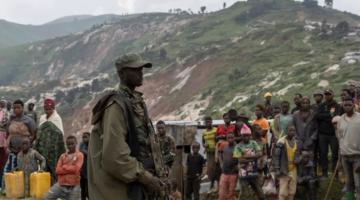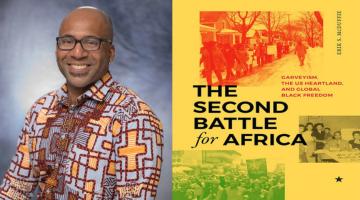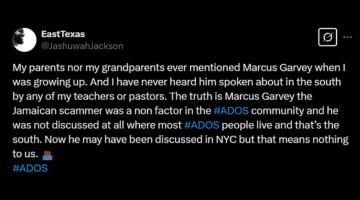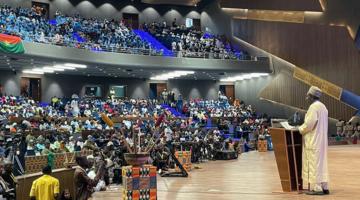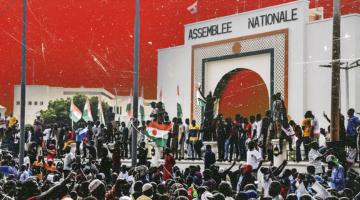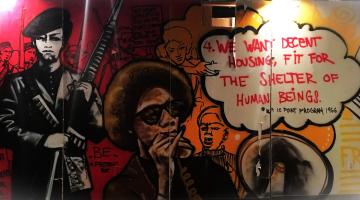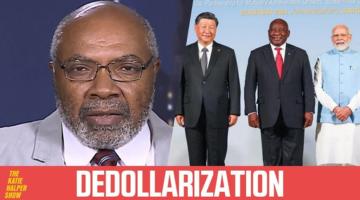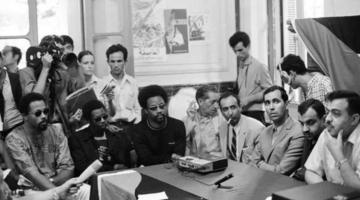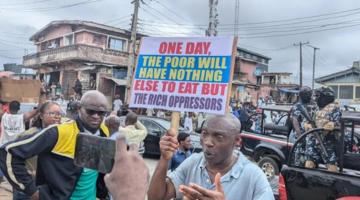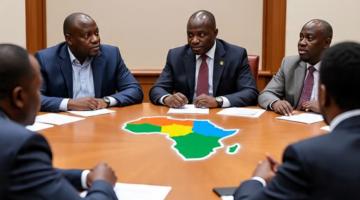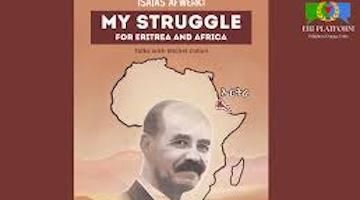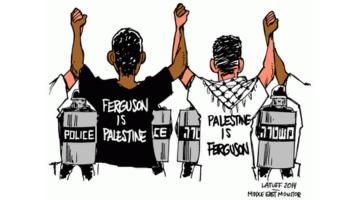It is now far more difficult for imperialists to launch direct boots-on-the-ground military attacks on Africa without an explanation.
“Plans were announced to discontinue seven of eight counterterrorism units in Africa, but the U.S. ill expand the use of armed drones.”
At a recent Pan-African conference, Samia Nkrumah attributed the imperialist militarization of Africa to the continent’s failure to develop its own strategies for defense. To avoid the establishment of foreign military bases on African soil, she said: “We must start a common defense strategy; our security must be planned together…[with a] military high command, a Pan-African army that would ensure peace and security not only in Africa but for the whole world.”
Samia Nkrumah is the daughter of the late Kwame Nkrumah who not only served as Ghana’s first president but who also steadfastly called for the consolidation of the entire African continent into one country governed by a single socialist government. He too advocated coordinated military action, but under circumstances that differ significantly from those observed and addressed by his daughter.
When Kwame Nkrumah outlined his military thoughts in his 1968 Handbook of Revolutionary Warfare, apartheid regimes in southern Africa were firmly entrenched and much of the rest of the continent remained under colonial rule. His focus was not so much on defense as it was on an affirmative, aggressive armed struggle to seize territory and transform regions of Africa into what he called “liberated zones.”
“Kwame Nkrumah steadfastly called for the consolidation of the entire African continent into one country governed by a single socialist government.”
Any plan for Africa’s military defense in the current era that would include the standing armies of the various African states is likely one in conflict with Kwame Nkrumah’s vision. Not only was he focused on coordinating the armed forces of revolutionary governments and non-governmental guerrilla forces of revolutionary political parties, but were he alive today he would likely have targeted many of Africa’s standing armies as enemy forces that serve neo-colonial governments that may be African in appearance, but which in practice do the bidding of foreign imperialists. In fact, Kwame Nkrumah’s long-range vision was for standing armies to disband. He said:
“As the people’s revolutionary struggle advances, professional armies as such will gradually disappear, until with the achievement of total African liberation and unity, and the establishment of an All-African Union Government they will vanish completely. The defense of Africa will then rest entirely on the continental people’s militia.”
The circumstances that Kwame Nkrumah hoped would lead to the elimination of standing armies are very different from the actual historical developments that now prompt questions about whether a military program for Africa is the most effective way to fight the continent’s enemies. Armies are designed to engage other armies in combat. However, if present trends continue, increasingly there will be fewer imperialist armed troops in Africa to engage.
“Were Nkruma alive today he would likely have targeted many of Africa’s standing armies as enemy forces that serve neo-colonial governments.”
Rising mass consciousness and the realities of war deaths have dramatically lowered the U.S. tolerance threshold for armed conflict. Notwithstanding his many idiosyncrasies, Donald Trump has his finger firmly on the pulse of those white workers in America who are his “base.” The sons and daughters of this group are dying in overseas military campaigns to protect U.S. access to oil, and there is long-simmering frustration about these deaths. A central Trump campaign promise was to bring troops home, and although his announcement of major troop withdrawals from Syria brought howls of alarm from the military-industrial complex, blue collar parents of deployed soldiers probably shouted with glee.
Africa too is witnessing the withdrawal of U.S. troops. In fact, the original purpose of U.S. Africa Command (AFRICOM) was to reduce if not eliminate prospects for American casualties by limiting U.S. military personnel to behind the scenes advisory and training roles, while having Africa’s armies engage in actual combat with forces that purportedly threaten U.S. interests. However, when four U.S. soldiers were killed in Niger in 2017, plans soon began for the withdrawal of U.S. troops.
“Blue collar parents of deployed soldiers probably shouted with glee at Trump’s Syria withdrawal.”
Recent media reports have referenced plans to close down U.S. military operations in (among other regions of Africa) Tunisia, Cameroon, Libya and Kenya. In addition, plans were announced to discontinue seven of eight counterterrorism units in Africa. Nevertheless, any benefits of troop withdrawal are offset by U.S. plans for expansion of use of armed drones even into parts of Africa that have not witnessed significant armed conflict. This means that traditional guerrilla tactics such as sabotage, harassment, and ambush may be rendered obsolete if attacks on Africa are limited to those carried out by remotely controlled armed drones.
There have been only rare occasions when African revolutionaries have been able to match the weaponry, equipment and technology of the enemy. Even if an effective method of combating a shadowy drone offensive is developed, there are yet other reasons to consider carefully whether the primary strategic emphasis should be on a military approach.
“Traditional guerrilla tactics such as sabotage, harassment, and ambush may be rendered obsolete.”
Revolutionary armed struggles are calculated to disrupt, destabilize, and if possible destroy enemy forces. In contemplation of armed struggles, over time, the U.S. in particular has committed to dominating Africa by meeting resistance with force. Although the U.S. population has far less tolerance for soldier deaths, the Pentagon has nevertheless taken that development in stride and developed alternative low-risk military approaches. It is therefore noteworthy that in recent years, non-military activities have had the effect of surprising, confusing and immobilizing the U.S. in Africa.
Specifically, China’s economic, diplomatic and political engagement in Africa has frustrated the U.S., and National Security Advisor John Bolton’s recent comments on the subject show the Trump administration has no clue about how to respond. “Basically [the U.S. is] missing the boat in Africa. We’re not even clear from an intelligence standpoint on what the underpinnings of a strategy would attempt to address and in part that’s because we have inadequate resources dedicated to the African continent,” said Mary Beth Long, a CIA veteran and former assistant secretary of defense for International Security Affairs.
“The U.S. has committed to dominating Africa by meeting resistance with force.”
During the early part of the 19thCentury, foreign interests pursuing access to Africa’s natural resources fought military battles against each other until they finally sat down in Berlin and worked out agreements for Africa’s colonization. If in the current era China had chosen to seek influence and control in Africa by force, a military response to such moves would have been entirely within the U.S. comfort zone. The U.S. would have, almost as a matter of routine, deployed troops to “protect” the poor, defenseless Africans from Chinese attacks while tightening the U.S. grip on affected regions in Africa. But rather than impose itself on Africa by military means, China has committed billions of dollars to African development and infrastructure, all the while engaging respectfully with African heads of state and negotiating presumptively mutually beneficial deals. The U.S. is greatly bothered by this, but is obviously in no position to attempt to muscle China off of the African continent militarily without inciting international outrage.
Africa too is in a position to engage in non-military acts that can potentially frustrate and immobilize the U.S. Several years ago, the National Conference of Black Lawyers (NCBL) drafted and published the “Model Code for the Reclamation, Protection and Preservation of African Land, Traditional Knowledge and Mineral Resources.”
The model code is an example of how African countries can enact legislation that establishes a process for not only the reclamation of settler-occupied land, but also for seizure of the mining, drilling and refining operations of U.S. and other foreign corporations.
“But rather than impose itself on Africa by military means, China has committed billions of dollars to African development and infrastructure.”
Although at the time of the model code’s publication it was believed to be only a visioning document that might raise Africans’ aspirations, there have since been instances when African governments have taken concrete steps toward reclaiming the people’s natural resources. As just one example, Tanzania enacted legislation to expand government control over foreign mining companies. In 2017 Tanzania not only seized diamonds worth $15 million from a foreign corporation, but it also hit a London-based gold mining company with a $190 billion fine for illegal operations and non-disclosure of all export earnings. In addition, land reclamation has been a high profile issue for quite a while in both Zimbabwe and South Africa. In these and other instances the western military-industrial complex has been shaken and somewhat confused about how to respond.
Lawful, orderly direct action against the resources and assets most valued by imperialists can cause disruptive, destabilizing consequences for foreign exploiters, which are objectives often pursued through military action. However, these initiatives are never a guarantee that western countries -- the U.S. and France in particular -- will not respond militarily, because using force is their standard modus operandi. Nevertheless, as one measure of revolutionary progress, it is now far more difficult for imperialists to launch direct boots-on-the-ground military attacks on Africa without an explanation. They must now concoct pretexts for such actions. These excuses can include anything from: the need to root out terrorists to the need to intervene to protect innocent civilians from government massacres to the need to perform a peace-keeping function.
“African governments have taken concrete steps toward reclaiming the people’s natural resources.”
In Africa’s ongoing campaign to strike blows against imperialist intervention and exploitation, it will be beneficial to give high priority to a war against foreign domination and exploitation of Africa’s natural resources that uses the law rather than armed soldiers. Such may yield not only some degree of reclamation of the people’s wealth, but also the disorientation of enemies with no clue about how best to respond. It may also save African lives by elevating the conflict from the realm of violence, destruction and death to the level of policy, economics and diplomacy.
Finally, Africans everywhere must remain alert for the possibility of military retaliation and they must be ever-vigilant in struggles to limit if not eliminate the imperialists’ capacity for armed attacks on Africa. To that end, full support should be given to organizations committed to these objectives, including Black Alliance for Peace and its campaign to shut down AFRICOM, and the All-African People’s Revolutionary Party and its ongoing efforts to analyze and adapt to 21stCentury conditions Kwame Nkrumah’s ideas regarding revolutionary warfare.
Mark P. Fancher is an attorney who writes frequently about the U.S. military presence in Africa. He can be contacted at mfancher[at]Comcast.net
COMMENTS?
Please join the conversation on Black Agenda Report's Facebook page at http://facebook.com/blackagendareport
Or, you can comment by emailing us at comments@blackagendareport.com

